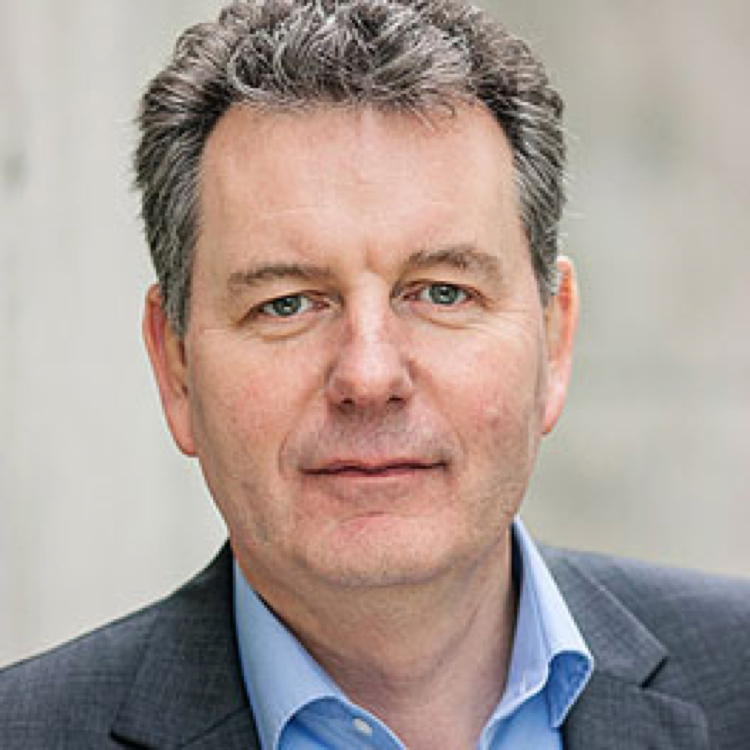
Prof. Dr.-Ing. Matthias Wessling
Die Integration von selektivem Stofftransport und Konversion in mikro-, meso- und makroskaligen Systemen bildet das Forschungsfeld der Arbeitsgruppe von Matthias Wessling. Insbesondere werden Systeme betrachtet, deren Funktionsprinzipien durch maßgeschneiderte Grenzflächen bestimmt werden. Makroskopische Systeme werden als Prozesstechnologie innerhalb der RWTH und der Aachener Verfahrenstechnik studiert, modelliert und entwickelt. Im Fokus der DWI-Arbeiten stehen mikro- und mesoskopische Systeme, welche drei wesentlichen Grundprinzipien von Grenzflächen integrieren: (a) selektiver Stofftransport, (b) molekular-spezifische Konversion und (c) Ladungstransport. Ziel ist dabei die Synthese bioinspirierter interaktiver Materialsysteme. Dabei werden mithilfe bestehender und neuartiger Materialien komplexe interaktive Strukturen entwickelt und deren Struktur-Funktionsverhalten im Wechselspiel mit stabilen oder zeitlich wechselnden Triebkräften analysiert und beschrieben. Anwendungsbeispiele finden sich in der Energiespeicherung, der Wasseraufbereitung und der Medizintechnik.
Curriculum Vitae
Matthias Wessling wurde 2010 durch die Berufung auf eine Alexander von Humboldt-Professur für den Lehrstuhl für Chemische Verfahrenstechnik der RWTH Aachen gewonnen. Er ist Prorektor für Forschung und Struktur an der RWTH Aachen und Mitglied der Wissenschaftlichen Leitung des DWI.
Von 2015 bis 2018 war er Stellvertretender Wissenschaftlicher Direktor des Instituts. Er ist Editor des ‚Journals of Membrane Science’. Nach dem Studium des Chemieingenieurwesens in Dortmund und Cincinatti promovierte er in Twente/NL. Er war Senior Research Scientist bei Membrane Technology and Research Inc., Menlo Park, CA/USA und Leiter der Abteilung ,Separation Processes’ bei Akzo Nobel. Von 2000-2010 war er Professor für Membrantechnologie der Universität Twente/NL.
Ausgewählte berufliche Funktionen, Ehrungen und Auszeichnungen
- 2022 Mitglied der Deutschen Nationalen Akademie der Wissenschaften Leopoldina
- 2019 Gottfried Wilhelm Leibniz-Preis
- 2016 ERC Advanced Grant ConFluReM (Controlling Fluid Resistance at Membranes)
- 2010 Alexander-von-Humboldt-Professur
- seit 2003 Wissenschaftliches Ehrenmitglied, Russian Academy of Science Institute TIPS (Topchiev Institute of Petrolchemical Sciences), Moscow
- 1994 Best Ph.D. Thesis Award, European Membrane Society
Publications
| Titel/Autoren | DOI-LINK | Magazine | Jahre | |
|---|---|---|---|---|
|
Reminding Forgetful Organic Neuromorphic Device Networks
D. Felder, K. Muche, J. Linkhorst and M. Wessling
|
https://doi.org/10.1088/2634-4386/ac9c8a | Neuromorphic Computing and Engineering | 2022 | |
|
Rotation-in-a-Spinneret Integrates Static Mixers inside Hollow Fiber Membranes
M. Tepper, Y. Eminoglu, N. Mehling, J. Walorski, H. Roth and M. Wessling
|
https://doi.org/10.1016/j.memsci.2022.120599 | Journal of Membrane Science | 2022 | |
|
Simulation-Based Guidance for Improving CO2 Reduction on Silver Gas Diffusion Electrodes
M. Heßelmann, B. C. Bräsel, R. G. Keller and M. Wessling
|
https://doi.org/10.1002/elsa.202100160 | Electrochemical Science Advances | 2022 | |
|
Single-Step Chitosan Functionalized Membranes for Heparinization
I. I. Rose, M. Kather, H. Roth, H. Dünkelberg, L. Rein, S. N. Klimosch, M. Schmolz and M. Wessling
|
https://doi.org/10.1016/j.memsci.2022.120567 | Journal of Membrane Science | 2022 | |
|
Surface Charge Affecting Fluid–Fluid Displacement at Pore Scale
A. Kalde, S. Lippold, J. Loelsberg, A.-K. Mertens, J. Linkhorst, P. A. Tsai and M. Wessling
|
https://doi.org/10.1002/admi.202101895 | Advanced Materials Interfaces | 2022 | |
|
TPMS-Based Membrane Lung with Locally-Modified Permeabilities for Optimal Flow Distribution
F. Hesselmann, M. Halwes, P. Bongartz, M. Wessling, C. Cornelissen, T. Schmitz-Rode, U. Steinseifer, S. V. Jansen and J. Arens
|
https://doi.org/10.1038/s41598-022-11175-y | Scientific Reports | 2022 | |
|
Two-Level Porosity Electrodes from Metal-Polymer Dispersions
A. Limper, T. Harhues, R. Keller, J. Linkhorst and M. Wessling
|
https://doi.org/10.1016/j.elecom.2022.107205 | Electrochemistry Communications | 2022 | |
|
Why Device Design Is Crucial for Membrane Adsorbers
F. Hagemann, D. Wypysek, K. Baitalow, P. Adametz, V. Thom and M. Wessling
|
https://doi.org/10.1016/j.jcoa.2021.100029 | Journal of Chromatography Open | 2022 | |
|
3D-Printed Bioreactor with Integrated Impedance Spectroscopy for Cell Barrier Monitoring
G. Linz, S. B. Rauer, Y. Kuhn, S. Wennemaring, L. Siedler, S. Singh and M. Wessling
|
https://doi.org/10.1002/admt.202100009 | Advanced Materials | 2021 | |
|
A Mini-Module with Built-in Spacers for High-Throughput Ultrafiltration
K. Baitalow, D. Wypysek, M. Leuthold, S. Weisshaar, J. Lölsberg and M. Wessling
|
https://doi.org/10.1016/j.memsci.2021.119602 | Journal of Membrane Science | 2021 | |
|
A scalable bubble-free membrane aerator for biosurfactant production
P. Bongartz, I. Bator, K. Baitalow, R. Keller, T. Tiso, L. M. Blank and M. Wessling
|
https://doi.org/10.1002/bit.27822 | Biotechnology and Bioengineering | 2021 | |
|
Additive Manufacturing of Composite Porosity Mixer Electrodes
A. Limper, N. Weber, A. Brodersen, R. Keller, M. Wessling and J. Linkhorst
|
https://doi.org/10.1016/j.elecom.2021.107176 | Electrochemistry Communications | 2021 |
